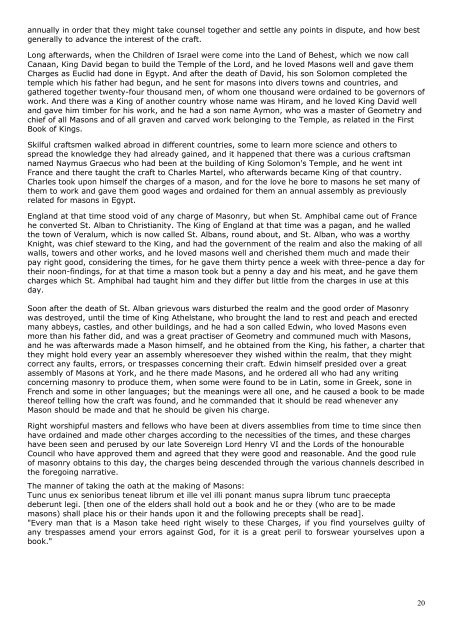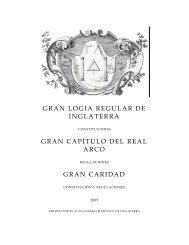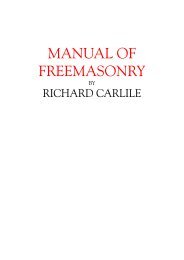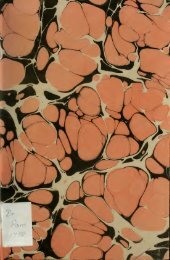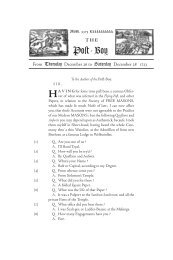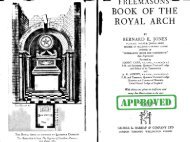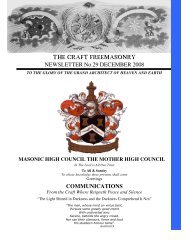THE CRAFT FREEMASONRY - Masonic High Council the Mother ...
THE CRAFT FREEMASONRY - Masonic High Council the Mother ...
THE CRAFT FREEMASONRY - Masonic High Council the Mother ...
Create successful ePaper yourself
Turn your PDF publications into a flip-book with our unique Google optimized e-Paper software.
annually in order that <strong>the</strong>y might take counsel toge<strong>the</strong>r and settle any points in dispute, and how best<br />
generally to advance <strong>the</strong> interest of <strong>the</strong> craft.<br />
Long afterwards, when <strong>the</strong> Children of Israel were come into <strong>the</strong> Land of Behest, which we now call<br />
Canaan, King David began to build <strong>the</strong> Temple of <strong>the</strong> Lord, and he loved Masons well and gave <strong>the</strong>m<br />
Charges as Euclid had done in Egypt. And after <strong>the</strong> death of David, his son Solomon completed <strong>the</strong><br />
temple which his fa<strong>the</strong>r had begun, and he sent for masons into divers towns and countries, and<br />
ga<strong>the</strong>red toge<strong>the</strong>r twenty-four thousand men, of whom one thousand were ordained to be governors of<br />
work. And <strong>the</strong>re was a King of ano<strong>the</strong>r country whose name was Hiram, and he loved King David well<br />
and gave him timber for his work, and he had a son name Aymon, who was a master of Geometry and<br />
chief of all Masons and of all graven and carved work belonging to <strong>the</strong> Temple, as related in <strong>the</strong> First<br />
Book of Kings.<br />
Skilful craftsmen walked abroad in different countries, some to learn more science and o<strong>the</strong>rs to<br />
spread <strong>the</strong> knowledge <strong>the</strong>y had already gained, and it happened that <strong>the</strong>re was a curious craftsman<br />
named Naymus Graecus who had been at <strong>the</strong> building of King Solomon's Temple, and he went int<br />
France and <strong>the</strong>re taught <strong>the</strong> craft to Charles Martel, who afterwards became King of that country.<br />
Charles took upon himself <strong>the</strong> charges of a mason, and for <strong>the</strong> love he bore to masons he set many of<br />
<strong>the</strong>m to work and gave <strong>the</strong>m good wages and ordained for <strong>the</strong>m an annual assembly as previously<br />
related for masons in Egypt.<br />
England at that time stood void of any charge of Masonry, but when St. Amphibal came out of France<br />
he converted St. Alban to Christianity. The King of England at that time was a pagan, and he walled<br />
<strong>the</strong> town of Veralum, which is now called St. Albans, round about, and St. Alban, who was a worthy<br />
Knight, was chief steward to <strong>the</strong> King, and had <strong>the</strong> government of <strong>the</strong> realm and also <strong>the</strong> making of all<br />
walls, towers and o<strong>the</strong>r works, and he loved masons well and cherished <strong>the</strong>m much and made <strong>the</strong>ir<br />
pay right good, considering <strong>the</strong> times, for he gave <strong>the</strong>m thirty pence a week with three-pence a day for<br />
<strong>the</strong>ir noon-findings, for at that time a mason took but a penny a day and his meat, and he gave <strong>the</strong>m<br />
charges which St. Amphibal had taught him and <strong>the</strong>y differ but little from <strong>the</strong> charges in use at this<br />
day.<br />
Soon after <strong>the</strong> death of St. Alban grievous wars disturbed <strong>the</strong> realm and <strong>the</strong> good order of Masonry<br />
was destroyed, until <strong>the</strong> time of King A<strong>the</strong>lstane, who brought <strong>the</strong> land to rest and peach and erected<br />
many abbeys, castles, and o<strong>the</strong>r buildings, and he had a son called Edwin, who loved Masons even<br />
more than his fa<strong>the</strong>r did, and was a great practiser of Geometry and communed much with Masons,<br />
and he was afterwards made a Mason himself, and he obtained from <strong>the</strong> King, his fa<strong>the</strong>r, a charter that<br />
<strong>the</strong>y might hold every year an assembly wheresoever <strong>the</strong>y wished within <strong>the</strong> realm, that <strong>the</strong>y might<br />
correct any faults, errors, or trespasses concerning <strong>the</strong>ir craft. Edwin himself presided over a great<br />
assembly of Masons at York, and he <strong>the</strong>re made Masons, and he ordered all who had any writing<br />
concerning masonry to produce <strong>the</strong>m, when some were found to be in Latin, some in Greek, sone in<br />
French and some in o<strong>the</strong>r languages; but <strong>the</strong> meanings were all one, and he caused a book to be made<br />
<strong>the</strong>reof telling how <strong>the</strong> craft was found, and he commanded that it should be read whenever any<br />
Mason should be made and that he should be given his charge.<br />
Right worshipful masters and fellows who have been at divers assemblies from time to time since <strong>the</strong>n<br />
have ordained and made o<strong>the</strong>r charges according to <strong>the</strong> necessities of <strong>the</strong> times, and <strong>the</strong>se charges<br />
have been seen and perused by our late Sovereign Lord Henry VI and <strong>the</strong> Lords of <strong>the</strong> honourable<br />
<strong>Council</strong> who have approved <strong>the</strong>m and agreed that <strong>the</strong>y were good and reasonable. And <strong>the</strong> good rule<br />
of masonry obtains to this day, <strong>the</strong> charges being descended through <strong>the</strong> various channels described in<br />
<strong>the</strong> foregoing narrative.<br />
The manner of taking <strong>the</strong> oath at <strong>the</strong> making of Masons:<br />
Tunc unus ex senioribus teneat librum et ille vel illi ponant manus supra librum tunc praecepta<br />
deberunt legi. [<strong>the</strong>n one of <strong>the</strong> elders shall hold out a book and he or <strong>the</strong>y (who are to be made<br />
masons) shall place his or <strong>the</strong>ir hands upon it and <strong>the</strong> following precepts shall be read].<br />
"Every man that is a Mason take heed right wisely to <strong>the</strong>se Charges, if you find yourselves guilty of<br />
any trespasses amend your errors against God, for it is a great peril to forswear yourselves upon a<br />
book."<br />
20


